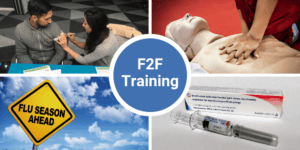Description


This trauma training is targeted at frontline staff who are supporting patients/clients/service users who have experienced trauma (usually long term interpersonal). They may also have mental health issues and or drug and alcohol problems as well as other chronic illness as a result of this trauma. It is also for frontline workers who have experienced trauma in their own lives and who may be in the role of ‘lived experience peer supporter’.
Trauma-informed practice is an approach to health and social care interventions which is grounded in the understanding that trauma exposure can impact an individual’s neurological, biological, psychological and social development. Trauma-informed frontline workers recognise the need to see beyond an individual’s presenting behaviours and to ask, ‘What has happened to this person, what does this person now need?’ rather than ‘What is wrong with this person?’ and react defensively, which then escalates the situation.
This course is suitable for any professional working with those who have experienced trauma. This may include: Doctors, nurses, psychologists, occupational therapists, care & support staff in a variety of settings: GP surgeries, primary care clinics, A&E, psychiatric hospitals, supported living for mental health, learning disability and autism. Housing Support Teams and Prison and Probation teams who are providing direct care and support.
Learning Outcomes
After attending this ‘Trauma Informed Care and Practice’ course, learners will be able to:
DAY 1
- Recognise how widespread trauma is – statistics
- Define and describe different kinds of trauma
- Explore the ACE study (Adverse Childhood Experiences)
- Discuss the impacts of developmental trauma (physical, psychological and social) in
- order to understand why traumatised people, behave in certain ways
- Discuss and differentiate between PTSD, complex PTSD and complex
- developmental PTSD
- Identify treatment modalities for each of the diagnoses
- 3 levels of care – professional, personal and social
DAY 2
- Differentiate between trauma informed and trauma skilled
- Explore self-care methods for a dysregulated nervous system caused by trauma
- Examine how trauma informed practice works
- Identify and apply the 6 trauma informed care principles in service settings – safety,
- trustworthiness, choice, collaboration, empowerment & cultural consideration.
- Develop appropriate responses to trauma disclosures
- Recognise personal compassion fatigue and act on it
Additional Information
This course has been developed and mapped to current occupational standards, qualification frameworks and the following documents and resources:
- Guideline for treatment and planning services for CPTSD in adults – UK Psychological Trauma Society
- Trauma informed framework – Scotland
- Trauma informed Wales
- Trauma informed care toolkit for carers – Surrey & Borders Partnership
What delegates say about our courses
“Course is very useful & practical. Well presented and clear and layout of site is good. Graphics very helpful.”
Peter Hughes
“This was my first experience at online learning, and I was extremely impressed. Feedback from my colleagues has also been positive. I know where to turn to for any future online learning and have no hesitation in recommending this company.
Michaela McCall








Reviews
There are no reviews yet.